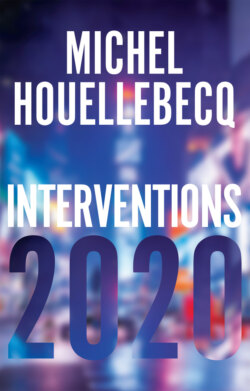Читать книгу Interventions 2020 - Мишель Уэльбек - Страница 14
The poetry of arrested movement
ОглавлениеIn May 1968, I was ten years old. I played marbles, I read Pif le Chien;3 life was good. Of the ‘events of ’68’ I have retained only one memory, albeit a quite vivid one. My cousin Jean-Pierre was then in his first year of high school in Le Raincy.4 High school then appeared to me (my later experience of it was to confirm this first intuition, while adding a painful sexual dimension) as a large and frightening place where older boys knuckled down to study difficult subjects in order to secure their professional futures. One Friday afternoon, I don’t know why, I went with my aunt to wait for my cousin after class. That same day, the high school in Le Raincy went on an indefinite strike. The schoolyard, which I expected to be filled with hundreds of teenagers dashing about, was deserted. A few teachers were standing around aimlessly between the handball posts. I remember, while my aunt was trying to gather some scraps of information, walking for long minutes across this yard. There was total peace, absolute silence. It was a wonderful moment.
In December 1986, I was at Avignon railway station, and the weather was mild. Following various sentimental complications too tedious to relate, I absolutely had – at least so I thought – to get the express train back to Paris. I was unaware that a strike movement had just started across the entire French railway network. Thus, the operational succession of sexual relations, adventure and weariness was suddenly shattered. I spent two hours, sitting on a bench, facing the deserted railway landscape. Express rail coaches stood immobile on the sidings. You’d have thought they’d been there for years, and had never even gone anywhere. They were just there, motionless. Information was passed in hushed tones from one traveller to the next; the mood was one of resignation, of uncertainty. It could have been war, or the end of the Western world.
Several more direct witnesses to the ‘events of ’68’ later told me that it was a wonderful time, when people talked to each other in the streets, and anything seemed possible; I’m happy to believe them. Others simply point out that the trains stopped running, that there was a petrol shortage; I have no difficulty agreeing. In all these eye-witness accounts I detect a common feature: magically, for a few days, a gigantic and oppressive machine stopped spinning. There was a hesitation, an uncertainty; a suspension occurred, a certain calm spread across the country. Of course, later on, the social machine started spinning again, even faster, even more ruthless than before (and May ’68 only served to break the few moral rules that still hampered the voracity of that machine’s operation). Still, there was a moment of pause, hesitation; a moment of metaphysical uncertainty.
It’s undoubtedly for the same reasons that, once the first moment of annoyance is overcome, the public’s reaction to a sudden shutdown of the information transmission networks is far from being absolutely negative. We can observe the phenomenon each time a computer reservation system breaks down (this is quite common): once the inconvenience has been admitted, and especially as soon as the employees decide to use their phones, what manifests itself among users is actually a secret joy; it’s as if fate were giving them an opportunity to take a sly revenge on technology. In the same way, if you want to realize what the public thinks, deep down, about the architecture in which it is made to live, you just have to observe its reactions when the decision is taken to blow up one of the residential low-rise blocks built in the suburbs in the sixties: it’s a moment of very pure and very violent joy, analogous to the intoxicating feeling of unexpectedly being set free. The spirit that inhabits these places is evil, inhuman, hostile; it’s that of an exhausting, cruel, constantly accelerating piece of machinery; basically, everyone feels this, and desires the machine’s destruction.
Literature can cope with everything, it can accommodate everything, it rummages through the garbage, it licks the wounds of misfortune. A paradoxical poetry, of anguish and oppression, has thus arisen amid the hypermarkets and office buildings. This poetry isn’t cheerful; it can’t be. Modern poetry is no more meant to build a hypothetical ‘house of Being’ than modern architecture is intended to build habitable places; this would be a very different task from that of increasing the number of infrastructures for the circulation and processing of information. As a residual product of impermanence, information is as different from meaning as plasma is from crystal; a society that has reached a plateau of overheating doesn’t necessarily implode, but it does turn out to be incapable of producing meaning, as all of its energy is monopolized by the description in terms of information of its random variations. We can all, however, produce in ourselves a kind of cold revolution, by stepping for a moment outside the flow of information and advertising. It’s very easy to do so; indeed, it’s never been as easy as it is today to adopt an aesthetic position in relation to the world: you just need to step aside. And this step itself, in the last instance, is unnecessary. You just need to take some time out; turn off the radio, unplug the television; stop buying stuff, stop wanting to buy stuff. You just need to stop participating, to stop knowing; to temporarily suspend all mental activity. You literally just need to stay still for a few seconds.
